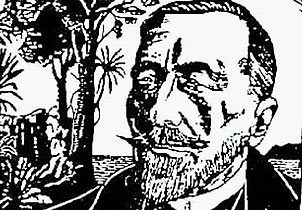Born during a revolutionary crisis; raised in exile; orphaned at 12; mercantile mariner at 17; failed suicide at 20; and a novelist of some repute from 35 on: it was, at the very least, an extraordinary life, and it sprang from an uneven and equally astonishing childhood.
Young Josef was born to wander the ends of the earth, though of course he never opted for it, and it is uncertain that he even had a choice. His father Apollo, a littérateur of some repute, a fiery revolutionary exiled to Siberia while trying to pry Poland—his homeland—out of pre-revolutionary Tsarist Russia, condemned his son along with himself and his wife to exile in the crude northern lands when he was only five. Josef’s mother died the year after; and for seven years his father gave young Josef a rudimentary, if eclectic, education in the howling wastes of the Arctic Circle. Apollo died when Josef was 12, and so the young lad, unfitted for life in civilization after his formative years without companionship, was sent to the urbane home of his maternal uncle Tadeusz from which he fled to Marseilles at 15 hoping to make a life as a sailor.
No doubt much of this was a romantic dream, but at 17 he was apprenticed to a ship, had made French his natural tongue, and relegated his existence to a double exile; first to Siberia and thence to the world. He was to visit home rarely after that, but despite that his books are about home: about the romanticism of the sea, and its harsh anti-romantic claims, and of self-imposed exile, a “most deracinating experience”.
His life at sea began colourfully enough: first gun-running in the Mediterranean, and then a voyage to the Caribbean smuggling in arms for Central European revolutionaries; experiences that fed at least three of his novels—Nostromo, The Secret Agent, Under Western Eyes] and a host of short stories.
Soon after he exiled himself entirely by changing his name: from Josef Teodor Konrad Korzeniowski he transformed himself into the anglicized Joseph Conrad. Life became more even-paced: he was hired aboard an English steamer; became a naturalized Englishman; learned English (his third, at age 24) and worked for a number of ships to voyages both far-eastern and coastal African. By now he had seen most of the world: Siberia, Poland, France, England, the West Indies, the Mediterranean, Malaysia, Java, India; and so when he finally went to the Congo he had the last – and most devastating – of his life’s experiences: watching the rapacious slave-and-ivory trade of the Belgian republic at first hand. He arrived home a broken man; made one small journey after that; and then, in one of the most astonishing mid-career changes of all he became – after a slow start – a writer of short stories and subsequently a novelist.
Conrad’s attitude to race and Empire remains a vexed issue. He had witnessed and experienced three Empires at their glorious high noons: the Tsarist, which had swallowed Poland; the French, which had eviscerated the Congo; and the English which was less fiercely local and less harshly extractive. Although he was of the opinion that all races are not equal and some needed paternalistic care, he was under no illusion about the hypocrisy of Empire. But insisted that all Empires were not alike. The Slavic (Tsarist) was barbaric; the Belgian (in the Congo) brutal and vicious; but the British he found humane and necessary. All Empires were not equal; and although he found himself thoroughly out of place in his adopted home – England – because of his accent and his experiences, he nevertheless retained his high regard for the mercantilist British Empire.
Henry James (himself an American) found his accent too thick for comprehension; Kipling found him an odd fellow whom he could only swallow in small doses; H.G.Wells was thoroughly mystified by this wandering seaman with strange tales; and although none of them for a moment doubted his very real literary gifts, none of them felt comfortable with him and his over-studied and dandyish Anglophilia. In the end Conrad, who despised Slavs, was himself assumed to be one; he was never at home in the one Empire which he admired; never felt racially at ease in the one country he felt was civilized. He remained, as ever, a man without a home even when he had settled down to a life of writing in the broad southern English countryside.




